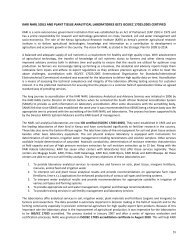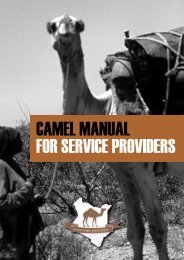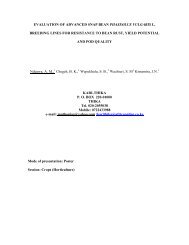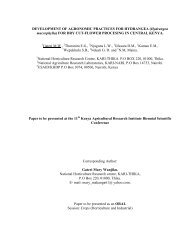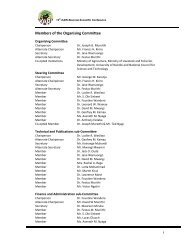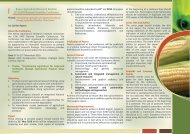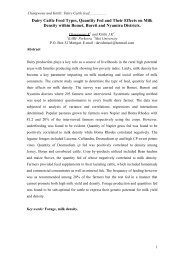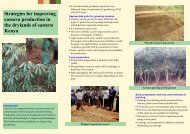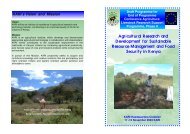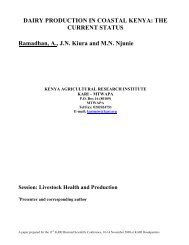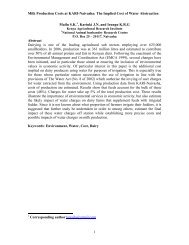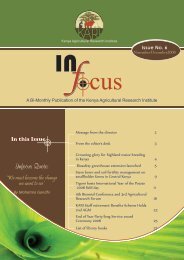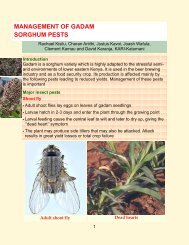January - June 2008 - Kenya Agricultural Research Institute
January - June 2008 - Kenya Agricultural Research Institute
January - June 2008 - Kenya Agricultural Research Institute
You also want an ePaper? Increase the reach of your titles
YUMPU automatically turns print PDFs into web optimized ePapers that Google loves.
KARI Initiates Performance Based Evaluation<br />
of <strong>Research</strong> Scientists for <strong>2008</strong> Promotions<br />
By Festus M. Murithi and Mercy W. Kamau, KARI Headquarters<br />
Performance based evaluation is considered the best<br />
and most objective method of evaluating staff in an<br />
organisation for purposes of rewarding good<br />
performers and sanctioning the poor ones. The KARI<br />
Human Resources Strategy and the Scheme of Service<br />
recommends the institutionalisation and regularisation of<br />
performance based evaluation for all cadre of staff in the<br />
<strong>Institute</strong>. Towards this end, KARI has adopted the annual<br />
appraisal for all staff, the mandatory signing of a<br />
Performance Contracts (PC) for all staff in Job group “J”<br />
and above, and the Performance based Evaluation of the<br />
research scientists.<br />
Since research scientists play a critical role in<br />
accomplishing the mission of a research organisation such<br />
as KARI, their evaluation should be elaborate, objective<br />
and impartial. Any rewards or sanctions for research<br />
scientists should therefore be based on an objective<br />
performance based evaluation.<br />
The KARI Management initiated performance based<br />
evaluation of its research scientists in 1997 and<br />
implemented the first performance based promotions in<br />
2001. The second evaluation exercise was carried out in<br />
2002 but the results were not implemented. The <strong>Institute</strong><br />
has however continued to promote scientists upon<br />
attainment of higher degree qualifications. The<br />
management plans to evaluate and promote research<br />
scientists based on their performance this year.<br />
The management considers that qualitative attributes<br />
are important when considering staff for higher levels of<br />
management/leadership responsibilities. The <strong>Institute</strong> is<br />
therefore in the process of institutionalising the annual<br />
appraisal of its entire staff through some qualitative<br />
assessment criteria. The appraisal considers 10 qualitative<br />
attributes which the immediate supervisor uses to assess<br />
staff working under him/her on a scale of 1-5. The ten<br />
criteria considered are: quality of work; quantity of work;<br />
cooperation; knowledge of the job; dependability;<br />
attendance and punctuality to duty; knowledge of the<br />
<strong>Institute</strong>’s policy and objectives; initiative and judgment;<br />
KARI scientists in a planning session in one of the programmes<br />
supervisory, leadership and technical potential; and work<br />
ethics. The annual appraisal will be considered as part of<br />
the overall evaluation and will contribute 20% of the final<br />
score.<br />
All officers designated as research scientists in their<br />
letter of appointments, including those on approved leave<br />
of absence and study leave, will be expected to complete<br />
the evaluation forms and provide scores for the various<br />
outputs as given in the criteria form and then return to the<br />
Centre Director within a specified period. Scores for the<br />
Annual Appraisal will be obtained from the Centres and<br />
appended to the scientist’s evaluation form. Officers in<br />
managerial positions (Centre Directors and Programme<br />
Officers) have the option to be evaluated as research<br />
scientists if they so wish or wait to be evaluated as<br />
managers.<br />
Each Centre Director will constitute a Centre Scientists’<br />
Evaluation Committee (CSEC) of five members (Centre<br />
Director, Deputy Centre Director, Centre Personnel officer<br />
and two senior scientists) to verify the outputs and scores<br />
for each scientist in their respective Centres. The verified<br />
forms will be sent to KARI Headquarters to be further<br />
verified by the Headquarters <strong>Research</strong> Scientists<br />
Evaluation Committee (RSEC).<br />
The scores from the quantitative evaluation form and<br />
the annual appraisal will be weighted appropriately (i.e.<br />
multiplying by 0.80, and 0.20, respectively) and a final<br />
score for each scientist will be determined. Those<br />
scientists to be considered for promotion will be identified<br />
using the cut-off score for each Job Grade and then<br />
recommended for promotion.<br />
It is planned that the promotions would be effected<br />
soon after the evaluation is completed. Each <strong>Research</strong><br />
Programme will be allocated a certain number of the senior<br />
positions of Chief <strong>Research</strong> Officers (CROs - RI 14) and<br />
Senior Principal <strong>Research</strong> Officers (SPRO – RI 13) after<br />
the establishment for each programme is determined.<br />
Those who meet the minimum qualifications for the senior<br />
positions in every programme will be interviewed by the<br />
Board of Management. This will ensure that each of the<br />
major programmes will have some officers in the senior<br />
positions of CROs and/or SPROs and those positions<br />
will be filled only when there is a vacancy in the particular<br />
programme. Scientists will continue to be promoted to the<br />
other grades (below SPRO) as they qualify.<br />
Since the last evaluation was conducted sometimes<br />
back (about seven years ago), the current evaluation will<br />
be taken to be a baseline upon which subsequent<br />
evaluations will build on. This implies that in the<br />
subsequent evaluations, researchers will only be required<br />
to indicate the incremental outputs generated after this<br />
evaluation. It is anticipated that the evaluation will be<br />
institutionalised to be conducted regularly at an interval<br />
of three years.<br />
Highlighter No. 23<br />
25



